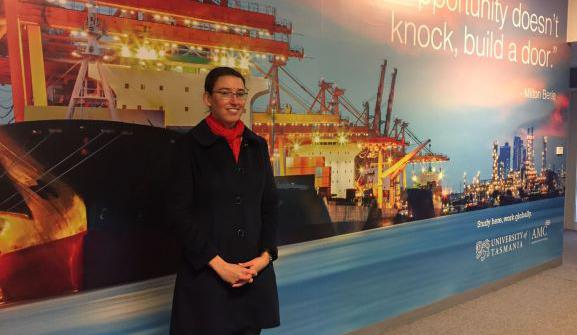Katie Fuller switched her career choice to have a "real go" and ended up navigating giant tankers
“I started sailing in a Mirror dinghy and ended up keeping watch on oil and gas tankers,” AMC alumni Katie Fuller says of her career progression.
The Mirror dinghy she sailed off the Queensland coast was about 3.3 m long compared with the 110,000 tonne, 272 metre LNG (liquified natural gas) tankers she helped navigate from Western Australia to Japan.
It is a typical path for many Australian Maritime College students who parlay their love of the sea and the beach into a living.
“Ever since I was a kid I was interested in boats, I never knew how to pursue a career in boats but I went to University and a couple of years later decided I’d like to have a go at going to sea,” she said.
Katie was studying a Bachelor of Laws when her nautical inspiration re-emerged.
“I had opted for a degree that seemed safe and sensible but after a couple of years I decided you have to have a crack at things and so I switched,” she said.
“I just realised that life was short and you have to have a go.
“So I came to an AMC Open Day and the following year enrolled in the pre sea course which is the first course for going to sea on big ships as a cadet.
It was a big career change to start something like that but I am absolutely glad that I did
“You start as a cadet and work your way up doing both sea time and study down here at the AMC and about three or three and half years later you can qualify as a third officer and then you are basically responsible for holding a watch on a ship.
After beginning at Beauty Point pre-sea (now held at Launceston campus) in 2009 she qualified as a second officer in 2012.
Her work as a third and second officer required working on the bridge for about eight hours a day in two separate watches.
“If you become a second officer you take more of a navigational role, you often get more involved in the safety officer side of things,” she said.
“During the day you can be up there by yourself but at night you have another crew member with you.
While the ships may be on autopilot when deep sea a visual lookout is kept with the help of radar with the aim of keeping on course, avoiding collisions with other vessels and maintaining safe navigation.
Katie said that with the accumulation of sea time and study an officer can move up to be chief officer and then master.
She passed an exam conducted by the Australian Maritime Safety Authority to become a chief officer.
“As you become chief officer you can help manage the crews on deck and the cargo, and the overall running of the ship. There is lots of interesting work and variety, and then there are other opportunities as pilot and other shore roles,” she said.
Qualifying at AMC with a Bachelor of Applied Science (Nautical Science) she spent nine years working on gas tankers.
“I got to travel a lot and also spent some time on oil tankers,” she said.
“I primarily worked out of Western Australia up to Japan but also to Korea and on a spot cargo carrier around Africa and through the Mediterranean.
“It was a pretty interesting job with a variety of work, variety of places and good people.”
She estimates that she has visited 25 ports in seven countries.
Katie says the new generation of ships which are quicker to load and unload reduce the time to see ports and visit countries.
“However, there are other opportunities as well, it is very different to other careers 9 to 5 in an office,” she said.
“There are opportunities on your leave as well to travel.”
Katie said AMC was a great environment if you were “willing to come and give things a real go”.
There are really supportive staff, a great learning environment, and classmates from all over the industry so you are meeting people who work on all different types of vessels and who are from all different parts of Australia and around the world.
“It is a fantastic networking opportunity and time to make friends.
She says she would like to see more women working in the industry.
“On average in my experience it is about five per cent women in the deck officer side of the industry, I’d always like to see more but there are some really good men and women working out there,” she said.
